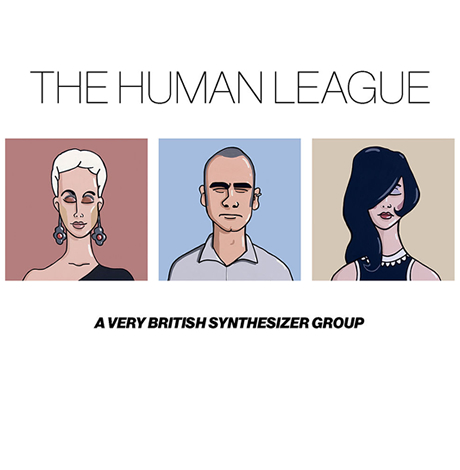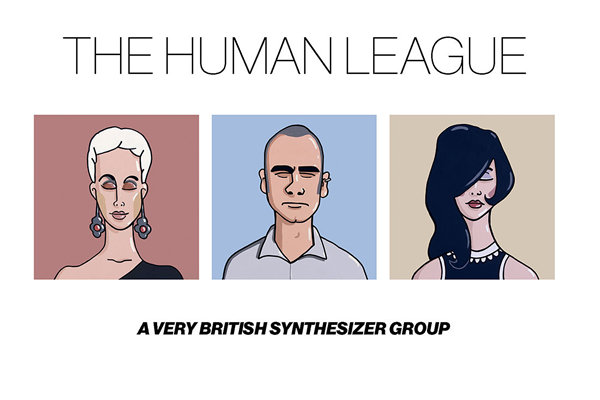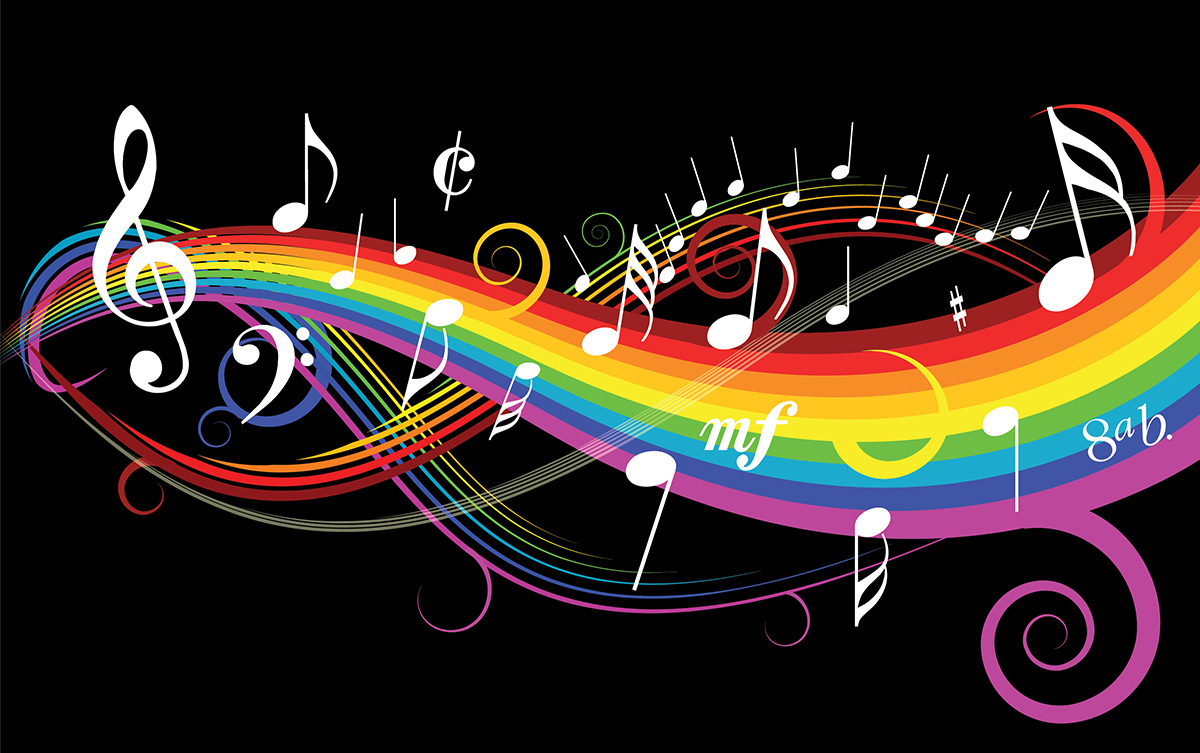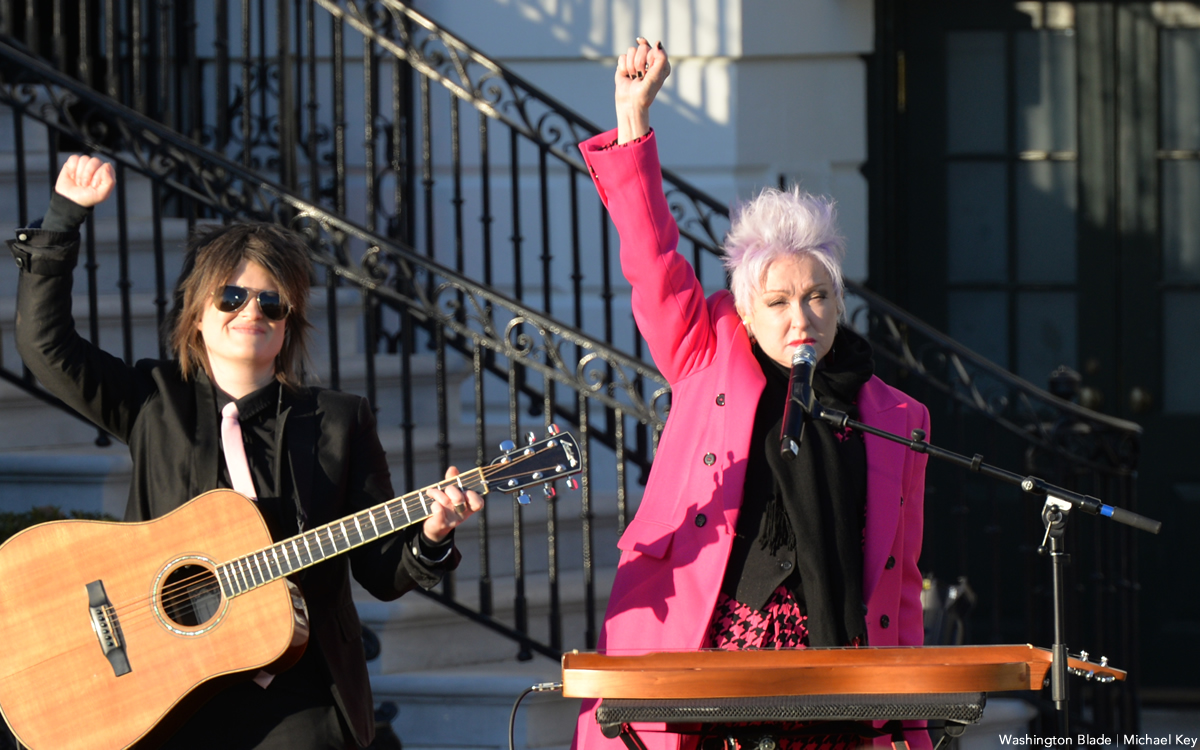Music & Concerts
The Human League gets deluxe treatment on new anthology
Illuminating sonic journey charts course of ’80s New Wave favorites


Revisit ‘80s Brit pop with ‘The Human League — A Very British Synthesizer Group.’ The booklet contains detailed interviews with Human League mainstays Phil Oakey, Joanne Catherall and Susan Ann Sulley, and the striking artwork consists of brightly drawn caricatures of the trio decked out in both their early ‘80s new wave fashion and their current look. (Photo courtesy Virgin Records)
You don’t get lines much more iconic than, “I was working as a waitress at a cocktail bar … that much is true.” “Don’t You Want Me” never really gets old no matter how many times you’ve heard it. It isn’t merely a novelty relic of its era — it’s a brilliantly conceived work of timeless pop and one of the decade’s most ubiquitous singalongs.
The Human League’s 1981 chart-topper closes the band’s third album “Dare,” widely regarded as a cornerstone of the new wave era. They are much more than that one smash, though, and now is a good time to discover what you might have missed along the way. Released in celebration of their 40th anniversary, “A Very British Synthesizer Group” is an excellent excursion through the influential British band’s extensive catalog.
The lavishly produced set is offered in multiple configurations. The two-CD version contains 30 of the band’s singles in chronological order. A four-LP vinyl edition released as a gorgeous (but expensive) box set contains the same track-listing. Also available is a deluxe edition including demos and early mixes, but this is for die-hards only.
Listening to “A Very British Synthesizer Group” in chronological order is illuminating, as the band’s musical progression unfolds. It begins with their debut single, 1978’s “Being Boiled,” an influential synthpop classic that’s very much of its time yet somehow timeless. The Human League’s early work is very raw as they are still finding their way, grappling with new technology and learning to be songwriters. Tracks like “Empire State Human” (1979), “Only After Dark” (1980) and “Boys and Girls” (1981) are primitive and charmingly weird, imbued with the singular vibe that would come to define the Human League.
The band’s first chart breakthrough in the U.K. was “The Sound of the Crowd” (1981), the first of a string of singles that would make the Human League synonymous with the ‘80s and the new wave era (the song is presented here in its instrumental version). The addition of Catherall and Sulley was the final ingredient that helped break the band internationally. The ladies weren’t professional vocalists by any means, but their working class realness and natural charm became an integral part of the Human League’s sound. Electro-pop classics “Love Action (I Believe in Love)” and “Open Your Heart” still sound fantastic, and of course “Don’t You Want Me” is irresistible as always.
The big hits are all here, like “Mirror Man,” “(Keep Feeling) Fascination” and their surprise 1986 chart-topper “Human,” written and produced by the unlikely collaborators Jimmy Jam and Terry Lewis. Later highlights include their exciting 1990 single “Heart Like a Wheel” and the band’s big 1995 comeback single, “Tell Me When.” The brilliant retro-pop “Stay With Me Tonight” (1996) and the energetic “All I Ever Wanted” (2001) are every bit as arresting as the band’s ‘80s classics. The set closes with three selections from their most recent album, 2011’s outstanding “Credo,” including the pulse-pounding “Night People” and “Never Let Me Go,” a pop charmer that manages to perfectly capture the Human League’s essence decades after their commercial peak.
The only negative is that the set is not quite definitive. Each disc hovers around 60 minutes (and several sides of the LP set contain only 4 tracks), leaving plenty of wasted space. Some of the more notable omissions include the early single “I Don’t Depend on You” and other scattered tracks and minor singles that would have made it a more complete and fulfilling collection: “The Things that Dreams Are Made Of,” “I Love You Too Much,” “The Sign,” “Are You Ever Coming Back?,” “Kiss the Future,” “Get It Right This Time,” “These Are The Days,” “Love Me Madly?,” “You’ll Be Sorry” and “Egomaniac.”
Still, “The Human League: A Very British Synthesizer Group” is a deeply satisfying and entertaining trip through this underrated band’s greatest moments. Human League doesn’t get the credit they deserve as an important part of the pop landscape over the last four decades — perhaps this set will help change that.
Music & Concerts
Washington chorale kicks off Christmas with vibrant program
‘Thine Own Sweet Light’ concerts planned

The full Washington Master Chorale will return for its annual holiday concert tradition with “Thine Own Sweet Light” on Friday, Dec. 19 and Sunday, Dec. 21 at St. Ann’s Catholic Church (D.C.) and Church of the Epiphany (D.C.).
The concert will feature the rich sounds of the 50-voice, a cappella chorus performing lush, seasonal choral music inspired by the theme of light. Highlights include Edvard Grieg’s “Ave Maris Stella,” Eric Whitacre’s “Lux Aurumque,” and Christopher Hoh’s “Holy, Holy, Holy is the Lord God of Hosts.” The program will also present a new work by Barcelona composer Josep Ollé i Sabaté, along with charming holiday folk songs and seasonal favorites.
For more details, visit the Washington Master Chorale website.
Music & Concerts
Queer mega stars (and allies) ready to take D.C. stages this fall
Watch LGBTQ icons light up stages across the DMV as they sing, dance, and drag their way through spectacular shows.

One of the best ways to welcome fall is by catching LGBTQ performers (and their allies) lighting up some of the D.C. area’s biggest stages. From country and pop to drag and rock, the season is packed with shows you won’t want to miss.
Maren Morris – The country, rock, and pop diva—known for hits like “The Bones” and for standing up against Nashville’s anti-LGBTQ voices—takes the stage at Wolf Trap (1551 Trap Rd, Vienna, Va.) on Friday, Sept. 12 at 8 p.m. Tickets start at $64.
RuPaul – The mother of modern drag and host of “RuPaul’s Drag Race” will spin a DJ set at Echostage (2135 Queens Chapel Rd NE) in Northeast D.C. on Sept. 20. Before RuPaul swaps wigs for headphones, Trade and Number 9 owner Ed Bailey will warm up the decks. For tickets and details visit echostage.com.
Conan Gray – The queer pop prince, celebrated for his Gen Z anthems like “Heather” and “Maniac,” brings his Wishbone Pajama Show to EagleBank Arena in Fairfax, VA, (4500 Patriot Cir) on Sept. 20 at 8 p.m. Tickets start at $113. For more info visit shop.conangray.com/pages/tour.
All Things Go Music Festival – With a lineup that includes Noah Kahan, Lucy Dacus, Kesha, Clairo, Doechii, and more, the beloved LGBTQ-friendly festival takes over Merriweather Post Pavilion (10475 Little Patuxent Pkwy, Columbia, Md.) Sept. 26–28. For tickets and details visit allthingsgofestival.com.
BERTHA: Grateful Drag – This unique tribute brings drag artistry and the sounds of the Grateful Dead to The Atlantis (2047 9th St NW) on Sept. 27. Tickets start at $47 at theatlantis.com.
Peach PRC – Rising Australian pop star and out lesbian, whose confessional tracks like “Perfect for You” and “Forever Drunk” have made her a queer TikTok darling, performs at The Atlantis on Sept. 29 at 6:30 p.m. The show is general admission only. Additional details are on theatlantis.com.
Addison Rae – The TikTok star-turned-pop princess, who’s crossed over into music with glossy hits like “Diet Pepsi” brings her sold out show to The Anthem (901 Wharf St., S.W.) on Sept. 30. Tickets are sold out, but resale options start around $80. For more info visit theanthemdc.com.
The Rocky Horror Picture Show 50th Anniversary – Celebrate the cult classic that’s been a queer midnight-movie staple for decades, with Barry Bostwick (a.k.a. Brad Majors) at the Warner Theatre (513 13th St., N.W.) on Oct. 2 at 8 p.m. Tickets start at $41 via Ticketmaster.
Chaka Khan, Patti LaBelle, Gladys Knight & Stephanie Mills – Four legends, one stage. Between Khan’s funk, LaBelle’s soul, Knight’s R&B, and Mills’ powerhouse vocals, this concert at Capital One Arena (601 F St NW) on Oct. 3 at 8 p.m. promises pure diva magic. Tickets start at $103. For more details visit capitalonearena.com.
Lorde – Joined by The Japanese House and Chanel Beads, the Grammy-winning New Zealand singer-songwriter behind “Royals” and “Solar Power” returns to The Anthem on Oct. 4 at 7 p.m. Lorde has long been embraced by queer fans for her dreamy pop and subversive lyrics. For more info visit theanthemdc.com.
Andy Bell (of Erasure) – The British queer rock icon, best known for synth-pop classics like “A Little Respect” and “Chains of Love,” brings his Ten Crowns Tour to the Lincoln Theatre (1215 U St., N.W.) on Friday, Oct. 17 at 8 p.m. Tickets are $90.45.
Doechii – The self-described queer “Swamp Princess”—and WorldPride 2025 headliner—continues her breakout year with the Live from the Swamp Tour at The Anthem on Oct. 21 at 8 p.m. Known for blending rap, R&B, and avant-garde performance art, Doechii is one to watch. Tickets start at $153.
Neon Trees – The out-and-proud Utah rockers behind “Everybody Talks” and “Animal” perform at the Lincoln Theatre on Friday, Oct. 24 at 8 p.m. Lead singer Tyler Glenn, who came out publicly in 2014, has become a strong queer voice in alternative rock. For tickets and info visit impconcerts.com.
Sasha Colby – The “RuPaul’s Drag Race” Season 15 winner strips down on the Stripped II Tour at the Warner Theatre on Nov. 2 at 8 p.m. Tickets available now on Ticketmaster.
Lola Young – The bisexual indie-pop sensation, whose raw songwriting has earned her millions of TikTok fans and multiple chart soaring hits visits The Anthem on Nov. 9 at 8 p.m. Tickets are still available.
Opera Lafayette
Featuring Mary Elizabeth Williams as Dido
+ Elijah McCormack, Chelsea Helm
Oct. 16, 7:30 p.m.
Sixth & I
PostClassical Ensemble
The Pale Blue Do: A Musical Voyage Inspired By Nature
Featuring National Geographic’s Enric Sala, Guest Curator
Wednesday, November 19, 7:30 p.m.
Terrace Theater
Washington Concert Opera
Starring Kate Lindsey, Theo Hoffman, John Moore, and Fran Daniel Laucerica
Nov. 23, 6 p.m.
Lisner Auditorium
Washington Master Chorale
An intimate a capella concert taking place in an architectural jewel, featuring cherished choral gems from Anglican and Catholic tradition and early American hymns. The concert will also present the world premiere of Christopher Hoh’s Holy, Holy, Holy is the Lord God of Hosts, and hymn singing featuring Robert Church, organist and choirmaster at St David’s.
Oct. 18, 7:30 p.m.
October 19, 5 p.m.
St. David’s Episcopal Church
Music & Concerts
Cyndi Lauper ready to have fun in Virginia
Superstar to bring final leg of farewell tour to Jiffy Lube Live

Superstar Cyndi Lauper will bring the final leg of her farewell tour “Girls Just Wanna Have Fun” to Bristow, Va., on Thursday, July 24 at Jiffy Lube Live.
Lauper’s international Farewell Tour – her first major headlining run in a decade – kicked off in North America last October, and included her first time ever headlining (and selling out) Madison Square Garden. Lauper’s performances have earned raves from the New York Times, Rolling Stone, Billboard, and many more, and surprise guests have included Chaka Khan, Sam Smith, and Hayley Williams. The tour just visited the U.K. and Europe, and will head to Australia and Japan in April.
Tickets are available on Live Nation’s website.














